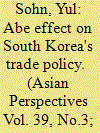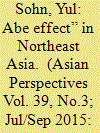| Srl | Item |
| 1 |
ID:
140688


|
|
|
|
|
| Summary/Abstract |
In this article, I show how Prime Minister Abe Shinzo has promoted two major national and international economic policies—Abenomics and Japan’s involvement in the Trans-Pacific Partnership— by focusing on his administration’s domestic political struggles. Both agendas become significant in the face of China’s regional engagement, demonstrating the inextricable ties between international affairs and domestic politics, a combination essential for grasping the “Abe effect” in foreign policy. KEYWORDS: Abenomics, TPP, decisionmaking process, agricultural reform in Japan.
|
|
|
|
|
|
|
|
|
|
|
|
|
|
|
|
| 2 |
ID:
140694


|
|
|
|
|
| Summary/Abstract |
Prime Minister Abe Shinzo’s decision to enter talks on the TransPacific Partnership (TPP) has been a game changer in the competition over Asia Pacific free trade agreements (FTAs). His move helped to create a space for multilateral, mega-FTA competition before South Korea could fully prepare and implement its “global FTA hub strategy” predicated on bilateral deals. In this article, I provide an overview of South Korea’s evolving strategies toward FTAs and explore how it has responded to the “Abe effect.” My focus is on two challenges for South Korea in participating in the TPP: US geopolitical pressure once Japan entered negotiations, and the de facto FTA negotiations with Japan under the TPP. Dealing with Japan is an especially tall order given the troubled history of South Korea–Japan economic and political relations. KEYWORDS: Korea-Japan relations, TPP, Abe Shinzo, hub strategy, security-economy nexus.
|
|
|
|
|
|
|
|
|
|
|
|
|
|
|
|
| 3 |
ID:
140683


|
|
|
|
|
| Summary/Abstract |
IN DECEMBER 2012 ABE SHINZO RETURNED TO POWER AFTER FIVE years in the political wilderness. Since taking office he has solidified his political leadership by winning all successive elections, paving the way to becoming one of the longest tenured premiers in postwar Japan. His security and foreign policies have already changed the landscape of international relations in East Asia as Tokyo’s relations with Seoul and Beijing spiraled down to new lows for the post–Cold War era. Abe’s new security policy, under the slogan “Proactive Contribution to Peace,” helped bring the Japan-US alliance to an unprecedented level of closeness, clearly pitted against China. The Abe government is also potentially challenging the China-centered new economic order by promoting the US-led Trans-Pacific Partnership (TPP) trade network. Abe’s decision to enter the TPP talks became a game changer in the race for free trade agreements in Asia and the Pacific.
|
|
|
|
|
|
|
|
|
|
|
|
|
|
|
|